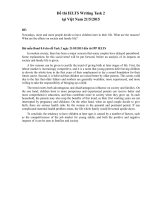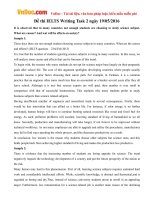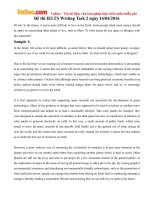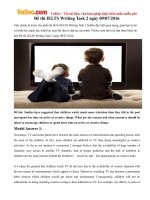Đề thi IELTS Writing Task 2 ngày 09/07/2016
Bạn đang xem bản rút gọn của tài liệu. Xem và tải ngay bản đầy đủ của tài liệu tại đây (396.67 KB, 3 trang )
VnDoc - Tải tài liệu, văn bản pháp luật, biểu mẫu miễn phí
Đề thi IELTS Writing Task 2 ngày 09/07/2016
Việc chuẩn bị trước cho phần thi đề thi IELTS Writing Task 2 là điều đặc biệt quan trọng, giúp bạn tự tin
và trình bày mạch lạc, tránh lan man khi đưa ra đáp án của mình. VnDoc.com mời các bạn tham khảo tài
liệu Đề thi IELTS Writing Task 2 ngày 09/07/2016.
Đề bài: Studies have suggested that children watch much more television than they did in the past
and spend less time on active or creative things. What are the reasons and what measures should be
taken to encourage children to spend more time on active or creative things.
Model Answer 1:
Nowadays, TV and smart phone have become the main sources of entertainment and spending leisure time
for most of the children. In fact, most children are addicted to TV than doing meaningful or creative
activities. As far as my opinion is concerned, I strongly believe that the availability of huge number of
channels, easy access to satellite TV channels, lack of proper guideline and the lack of ambition in
children are the main reasons behind the children's'
inactivity and
less participation in creative tasks.
It is taken for granted that children watch TV all the time due to the availability of various channels with
diverse means of entertainment which appeal to them. Moreover, watching TV has become a permanent
habit without which children would get bored and uninterested. Consequently, children will not be
enthusiastic in doing anything creative owing to their addiction to TV. For example, my child is 6 years of
VnDoc - Tải tài liệu, văn bản pháp luật, biểu mẫu miễn phí
age. He is used to spending his time on watching TV rather than on creating or making new things. I have
been endeavoring to let him active and do new things, but unfortunately he always refuses to do so. This is
surely because he is accustomed to this habit since his tender age. Again, bygone are the days when a
small percentage of households in a country owned TV sets. On the contrary these days a single family
owns more than one TV and all of them have satellite connections. Moreover, children these days can
watch TV programmes from their smart phones using internet. The easy access to TV channels has made
them prone to watch it more.
Another reason which deprives children of doing creative activities or new things is the lack of ambition
and encouragement. Unfortunately, most of the parents do not motivate or encourage their children on
what children do or intend to do. For example, my niece seems to be a pessimistic child because whenever
she does or intends to do anything, her parents neglect her instead of encouraging and appraising her.
However, children can reduce the hours spent on watching TV and utilise those hours in doing creative or
active things. If highly encouraged and motivated, children are expected to engage in those useful works
and be accustomed to doing creative and effective activities, no matter how difficult or complex those
works or activities are. Again teachers in school should also motive them to get involved in creative works.
Parents should allow children to watch suitable TV programmes for a certain period of time each day and
they should also get involved in different activities to set example for their children. Consequently,
children will be highly effective and proficient when they become adult and this surely is attributed to
their past useful experience.
To conclude, children spend much time watching TV because of the easy access of numerous channels and
the lack of zeal to do useful things. To eradicate this phenomenon, children must be motivated, guided and
mentored.
[Written by - Abdulaziz Alharthi]
Model Answer 2:
Laurence J. Peter has rightly said that ‘Television has changed the child from an irresistible force to an
immovable object.’ After coming home from school, children spend a lot of time in watching TV instead
of playing outdoor games and pursuing other creative hobbies like in the olden days. In the following
paragraphs, I shall discuss the causes of this phenomenon and also suggest some ways forward.
VnDoc - Tải tài liệu, văn bản pháp luật, biểu mẫu miễn phí
The first and foremost cause of this is that due to the satellite TV, this medium is available all the time. So
much so, that some channels are exclusively dedicated to children. This has made it very easy for the
parents who use TVs as baby sitters. Secondly, parents are busy to cope with the demands of the fast
paced life of today and after coming home after a hectic days work do not have the energy to spend time
with their children. In earlier times, there were very few programs for children and because of slower life,
even parents spent time with children.
Furthermore, earlier there were joint families and grandparents were there to look after children and
encourage them to play in parks. Nowadays, there are nuclear families and children are left alone which
makes them spend time by watching TV. Finally, the cities have become concrete jungles and there is no
place for children to play outdoor games. On top of that, the climate changes brought about by global
warming make it difficult to pursue outdoor games.
The solutions are simple but the onus is largely on the parents. They should give quality time to their
children and ration their TV viewing hours. Even the time to play video games should be set properly.
Outdoor activities should be encouraged and neighborhood societies should be formed where children can
play outdoor games with each other. Parks should be maintained properly so that children have a safe
place to play outdoors.
In conclusion, I believe that, television and video games, in moderation, can be a good thing. However,
excess of everything is bad and therefore I believe parents should set viewing limits to ensure their
children do not spend too much time watching TV and pursue other creative activities like they did in the
earlier times.









